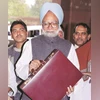AS FINANCE MINISTER
1991:
> India pledges gold with the Bank of England and UBS to increase foreign currency reserves in the face of an imminent external payments crisis.
> Rupee is devalued in two stages by about 18 per cent.
> Many chapters of the Monopolies and Restrictive Trade Practices Act of 1969 repealed, allowing greater freedom to companies to expand existing capacity or to set up new units.
1991-92
> Quantitative restrictions on imports abolished. Chief Controller of Imports and Exports replaced by Directorate General of Foreign Trade.
> Mutual fund industry opened to the private sector.
1992
> Capital markets regulator Securities and Exchange Board of India (SEBI) became a statutory body.
> National Stock Exchange established in Mumbai
1993-94
> RBI issues licenses to 10 private sector banks.
> Five-year tax holiday offered to units set up in software technology parks and electronic hardware technology parks.
> Nationalised banks allowed to tap the capital market to strengthen their capital base.
> Rupee made convertible on the current account.
> Introduction of Service Tax: Broadened the tax base by taxing services, marking a shift in India’s taxation policy.
1995
> Banks allowed to fix their own interest rates on domestic term deposits.
1996
> Minimum Alternate Tax reintroduced for companies.
AS PRIME MINISTER
2005
> Right to Information Act (RTI) passed to empower citizens to seek information from public authorities, promoting transparency.
> National Rural Health Mission (NRHM) launched to strengthen healthcare delivery in rural areas.
> Special Economic Zones (SEZ) Act passed to boost exports through incentives and simplified processes.
> National Rural Employment Guarantee Act (NREGA) passed, guaranteeing 100 days of wage employment annually to rural households.
> Jawaharlal Nehru National Urban Renewal Mission launched to improve the quality of life in Indian cities.
2007
> National Food Security Mission (NFSM) launched to increase production of rice, wheat, and pulses.
2008
> Farm loan waiver to provide debt relief to millions of farmers.
2009
> Right to Education Act passed, makes free and compulsory education a fundamental right for children aged 6-14.
> Delhi-Mumbai Industrial Corridor (DMIC) initiated as a mega industrial project to enhance connectivity and boost industrial growth.
2010
> Unique Identification Authority of India (UIDAI) rolls out Aadhaar to improve service delivery through biometric identification.
2012
> Significant increase Foreign Direct Investment limits in telecom, retail, broadcasting, civil aviation and insurance sectors.
2013
> Direct Benefit Transfer (DBT) launches cash transfer schemes to reduce leakages in welfare programmes.
> Food Security Act enacted to provide subsidised food grains to nearly two-thirds of India’s population.
> Parliament passed Pension Fund Regulatory and Development Authority (PFRDA) Act, opens the pension sector to private players.
> Companies Act, 2013 enacted to significantly improve corporate governance norms.
> Lokpal and Lokayukta Act create an anti-corruption ombudsman at the central level.
)

)